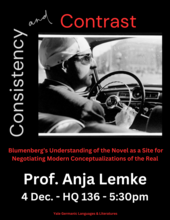“Consistency and Contrast” – Blumenberg’s Understanding of the Novel as a Site for Negotiating Modern Conceptualizations of the Real, with Prof. Anja Lemke
“Consistency and Contrast” – Blumenberg’s Understanding of the Novel as a Site for Negotiating Modern Conceptualizations of the Real
If and how we can conceptualize the world we are living in, was a question crucial to Blumenberg throughout his entire work. His famous essay “The Concept of Reality and the Possibility of the Novel” (1964) links this question to the rise of a genre that was conceived as poetologically inferior until well into the 18th century. It describes how the esthetic shift from mimetic representation to artistic autonomy goes along with the historic turn from cosmological and theological concepts of the world towards contingency and possibility.
Consequently, most literary scholars so far have drawn their attention to the relation between Blumenberg’s “third concept of reality” and his characterization of the novel as a modern genre, including its ability to “actualize a world” instead of imitating it.
This lecture argues for a different approach to Blumenberg’s essay by concentrating on the relation between the third and the fourth concept of reality, that is the relation between “inner consistence” and “contrast”, the “actualizing of a world” and its “resistance”. This change in perspective enables us to not only reconsider the relation between the historical and the systematic status of Blumenberg’s different reality-concepts, but also to understand the role of the novel differently: The novel allows for the experience of the modern world as contingent and also enables us to observe the linguistic rules of construction of its precarious inner consistency as the always only momentary result of a dynamic communicative struggle in the light of an uncontrollable future.
